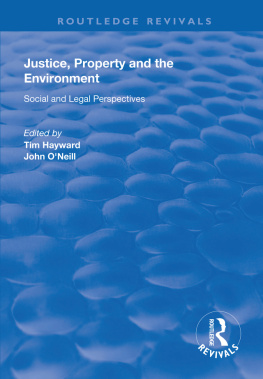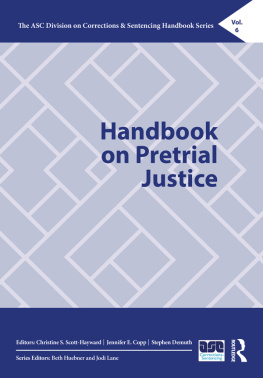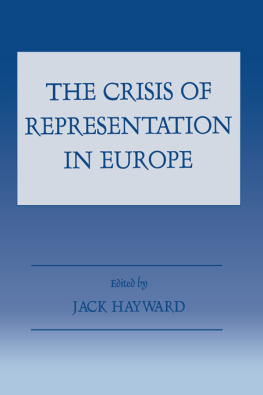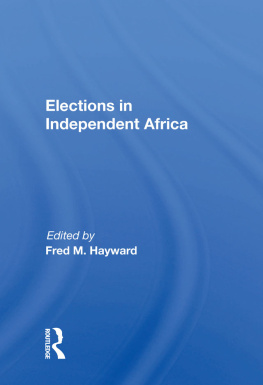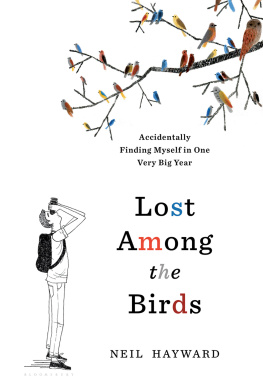UK Association for Legal and Social Philosophy
The UK Association for Legal and Social Philosophy (ALSP) is open to everyone interested in the interaction between theory and practice in the areas of legal, social and political thought; the interplay between these areas; and the applications and outcomes arising out of the inter-disciplinary nature of such debate. In seeking to extend debate beyond the traditional academy, it is especially concerned to include students and practitioners in its activities, as well as to promote discussion with, among and beyond full-time academics.
Membership is currently 20 (waged) or 10 (unwaged) per annum, which includes a subscription to Res Publico: A Journal of Social and Legal Philosophy and the Association's newsletter. For details, please write to the Treasurer, Ms P FitzGerald, 7 Adur Court, Stoney Lane, Shoreham -by-Sea, West Sussex BN43 6LY (e-mail: ).
Justice, Property and the Environment
Social and Legal Perspectives
Edited by
Tim Hayward
University of Edinburgh
John O'Neill
Lancaster University
First published 1997 by Ashgate Publishing
Reissued 2018 by Routledge
2 Park Square, Milton Park, Abingdon, Oxon, OX14 4RN
711 Third Avenue, New York, NY 10017, USA
Routledge is an imprint of the Taylor & Francis Group, an informa business
Copyright Tim Hayward and John ONeill 1997
All rights reserved. No part of this book may be reprinted or reproduced or utilised in any form or by any electronic, mechanical, or other means, now known or hereafter invented, including photocopying and recording, or in any information storage or retrieval system, without permission in writing from the publishers.
Notice:
Product or corporate names may be trademarks or registered trademarks, and are used only for identification and explanation without intent to infringe.
Publishers Note
The publisher has gone to great lengths to ensure the quality of this reprint but points out that some imperfections in the original copies may be apparent.
Disclaimer
The publisher has made every effort to trace copyright holders and welcomes correspondence from those they have been unable to contact.
A Library of Congress record exists under LC control number: 97074449
ISBN 13: 978-1-138-32276-9 (hbk)
ISBN 13: 978-0-429-45180-5 (ebk)
Contents
Tim Hayward
Ted Benton
Kate Soper
David E. Cooper
Tim Hayward
Robin Attfield
Markku Oksanen
John O 'Neill
Russell Keat
Donald McGillivray and John Wightman
C.M.G. Himsworth
Anthony Stenson and Tim Gray
Joan Martinez-Alier
We would like to thank Pat FitzGerald, Bob Brecher, Liz Kingdom and Sarah Markham for all their support and assistance in producing this volume. An earlier version of 'The Merchandising of Biodiversity' by Joan MartinezAlier was published in Capitalism, Nature and Socialism and is published with the permission of Guildford Press
Tim Hayward
Environmental problems are also social problems, both in their causes and their effects. Environmental degradation is being brought about by socially organised practices, and it has generally been allowed to occur because those with the power of decision have deemed it a necessary and acceptable sacrifice justified by the benefits the practices bring. Yet there is now growing concern about whether the benefits really do always justify the damage incurred: the question thus arises of whether a different set of normative priorities may be required as part of a solution to environmental problems. As this question receives increasing attention in international fora, however, a further dimension to it also becomes increasingly evident, namely: who benefits, and who bears the losses? The effects of environmental degradation are not necessarily experienced as costs by the people who cause - and most benefit - from them. Indeed, many of the most serious environmental problems are not evenly distributed but are felt most acutely by people who are also already subject to socioeconomic disadvantage. Thus, as is now widely recognised, and as the cleavage between rich and poor nations at the Rio Summit, for instance, testifies, questions of environmental policy are inextricably linked with questions of social justice.
As well as the question of an equitable distribution of environmental costs and benefits among living humans, questions of justice arise in relation to two other categories: do future generations of humans have rights to have their needs taken into account in present decision-making about the use and distribution of natural resources? Are there some non-human natural beings who should be considered not simply as resources, but as beings who themselves are entitled to just treatment?
In addition to these questions of normative principle, there are also questions concerning the most appropriate and effective policies for implementing social and environmental justice. There seems to be some potential for developing existing legal instruments to this end. For instance, laws of public and private liability can be so developed that stricter requirements are placed on those who cause environmental harms and greater possibilities for action are granted to those affected by them. There is also the possibility that the assignment of new environmental rights, or rights connected with genetic resources, for instance, help redress inequities in the distribution of resources.
Moreover, both the theory and application of justice in relation to the environment raise questions concerning property rights: on one view, the assignment of property rights in environmental goods or natural phenomena is a solution to the problem of the lack of incentive on identifiable parties to protect or conserve them; on another view, though, it is the interests of privateproperty owners themselves which most strongly conflict with environmental imperatives. Debate about this relates to the question of whether environmental harm occurs as a result of market failures, or is in fact due to the lack of regulation of market forces.
This is the range of complex and interrelated questions concerning justice, property and the environment which is explored in the present volume.
Justice and sustainability: equity, futurity and environment
Since the publication ten years ago of the influential Brandt!and report, the three aims of securing environmental protection, equity in distribution and justice for future generations have been explicitly linked together in the idea of sustainability. What sustailiability means in practice, though, is a matter of some considerable debate, and different views reflect different theoretical understandings. The questions that arise at the level of normative theory are investigated by a number of contributors to this volume.
Ted Benton examines the linkages between the first two general aims of sustainability, focusing on the question of how well traditional conceptions of social justice are able to accommodate the new environmental concerns. He sets out the central issues involved by identifying some key features of green thought that represent a challenge to traditional conceptions of justice. One is the idea of natural limits: this renders problematic the usual assumption in theories of justice of merely moderate scarcity and so also calls into question principles of distributive justice which, like Rawls's difference principle, depend on indefinite economic growth. Benton points out that under condit ions of more severe scarcity, such principles have radically redistributive implications.


